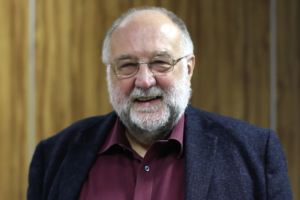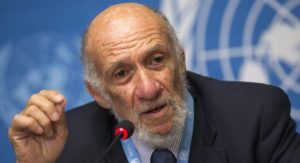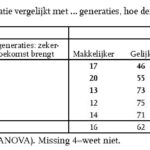Does the UK Need the EU? An Interview With Malcolm Sawyer
What was Brexit all about? What will its most likely consequences for UK, EU, and the world economy at large? Renowned British economist Malcolm Sawyer, Emeritus Professor of Economics at Leeds University, UK, discusses these and other related issues in an exclusive interview below with C. J. Polychroniou.
C. J. Polychroniou:Brexit has happened. The UK has gotten a divorce from the European Union (EU), after being a member for 47 years. Is this a cultural and political revolution?
Malcolm Sawyer: As of 11pm. (UK time) on 31st January 2020, the UK is no longer a member of the EU, and as such does not participate in the political deliberations of the EU (e.g. no longer any UK members of the European Parliament, UK government ministers do not attend meetings of council of ministers). However, during what is termed a transition period, intended to be completed by 31st December this year, very little has changed in the economic and social relationships between the UK and the EU. Trade continues to take place on the same terms as before, the free movement of labour between countries continues, etc. etc.. The economic effects of UK’s leaving of the EU are yet to be felt, e.g. those from changes in the trading arrangements. To date, there have been effects of the prospects of Brexit: the sterling exchange rate declined sharply shortly after the referendum from which it has not yet fully recovered, and investment has been subdued through uncertainty of the future relationships.
The referendum result was 52/48 in favour of leave over remain, and opinion polls since the referendum have tended to find some, albeit small, movement in opinion towards remain. The general election result of December 2019 resulted in a large Parliamentary majority for the Conservative government with Boris Johnson as Prime Minister, but based on a 43 per cent share of the national vote. The main political parties against Brexit without a further referendum, and against what is often termed a ‘hard Brexit’ (which is now the probable outcome) secured 52 per cent of the national vote.
At the present time, very little has changed in the day-to-day relationships between the UK and the EU. Trade relationships, movement of peoples etc will be decided upon over the next few months. It remains to be seen how co-operative will be the future relationships between the UK and the EU – much of the Brexit campaign has been based on hostility and suspicion of the EU, which undermine future co-operation. Brexit and the campaigns surrounding it have shown up deep divisions within British society.
C. J. Polychroniou: What are the implications of Brexit for the future of Great Britain, the EU, and the world economy at large?
Malcolm Sawyer: Future of UK. The result of the referendum (2016 on remain or leave the EU) revealed significant differences between age groups (old more likely to vote leave than the young), and geographical (cities more likely to vote remain than towns and rural areas). There were also differences between the constituent nations of the UK – England and Wales both voted to leave, and Scotland and Northern Ireland to remain.
There are forces which could propel a break-up of the United Kingdom with Scotland becoming an independent nation and Northern Ireland re-unified with Ireland. The pressures for independence in Scotland are enhanced by the UK leaving the EU, with a Scottish National Party (SNP) in power in Scotland (albeit as a minority government) continuing to push for a second referendum on Scottish independence. A majority of members of the Scottish Parliament favour independence (SNP plus Scottish Green Party) and recent opinion polls put support for independence slightly in the lead.
James Baldwin Debates William F. Buckley (1965)
The legendary debate that laid down US political lines on race, justice and history
In 1965 at the University of Cambridge, two of the foremost American intellectuals were challenged with the question: ‘Has the American Dream been achieved at the expense of the American Negro?’ From William F Buckley’s highly stylised posturing and pointing, to James Baldwin’s melodious rhetorical flourishes and memorable scowls, what’s become known as the ‘Baldwin-Buckley Debate’ now stands as one of the archetypal articulations of the dividing line between US progressives and conservatives on questions of race, justice and history. Baldwin, the famed African-American writer, whose reputation as a progressive social critic and visionary Civil Rights activist has only risen in the intervening decades, argues that the very foundation of US society is built on the dehumanisation of its African-American population. Meanwhile, Buckley, the leading US conservative intellectual of the period, argues that African Americans would be best served by exploiting their country’s many freedoms and opportunities, rather than pointing a collective finger at discriminatory structures and institutions. In both cases, their positions presage contemporary divisive debates in the US, though one wonders whether such an event could happen in today’s political environment.
While usually reduced to short clips, the full hour-long debate – presented here in its entirety – is a remarkable historical document in its own right. Conducted in front of a large, almost entirely white and predominantly male audience at the Cambridge Union, the encounter offers a sense of campus intellectual life in the mid-1960s through the atmosphere in the room, the things that made people laugh, and the particular references made by the debaters. After the always eloquent Baldwin evokes his personal experience to describe a perpetually disorienting and demeaning existence for African Americans, Buckley responds with facts and figures – as well as an ad hominem shot at Baldwin’s speaking voice – to argue that there’s an American Dream available to all those who would pursue it. In the end, Baldwin prevailed, earning an ardent standing ovation and a landslide victory in the Union’s vote on the motion raised.
From: https://aeon.co/the-legendary-debate-that-laid-down-us-political-lines-on-race-justice-and-history
Noam Chomsky: Sanders Threatens The Establishment By Inspiring Popular Movements
The impeachment trial of Donald Trump for power abuses is winding down, with his acquittal all but ensured when the Senate reconvenes on Wednesday to vote on the articles of impeachment. Yet, his real crimes continue to receive scant attention, and it is Sen. Bernie Sanders who is regarded by the political establishment as the most dangerous politician because of his commitment to a just and equitable social order and a sustainable future. Meanwhile, the conclusion of the Davos meeting in January demonstrated the global elites’ ongoing commitment to unimpeded planetary destruction.
This is indeed the state of the contemporary U.S. political environment, as the great public intellectual Noam Chomsky points out in this exclusive interview for Truthout.
C.J. Polychroniou: The impeachment trial of Donald Trump isnearlyover, and what a farce it has been — something you had predicted from the start, which is also the reason why you thought that an impeachment inquiry was a rather foolish move on the part of the Democrats. With that in mind, what does this farcical episode tell us about the contemporary state of U.S. politics, and do you anticipate any political fallout in the 2020 election?
Noam Chomsky: It seemed clear from the outset that the impeachment effort could not be serious, and would end up being another gift by the Democrats to Trump, much as the Mueller affair was. Any doubts about its farcical nature were put to rest by its opening spectacle: Supreme Court Chief Justice John Roberts struggling to keep a straight face while swearing in senators who solemnly pledged that they would be unmoved by partisan concerns, and at once proceeded — as everyone know they would — to behave and vote along strictly party lines. Could there be a clearer exhibition of pure farce?
Are the crimes discussed a basis for impeachment? Seems so to me. Has Trump committed vastly more serious crimes? That is hardly debatable. What might be debatable is whether he is indeed the most dangerous criminal in human history (which happens to be my personal view). Hitler had been perhaps the leading candidate for this honor. His goal was to rid the German-run world of Jews, Roma, homosexuals and other“deviants,” along with tens of millions of Slav “Untermenschen.” But Hitler was not dedicated with fervor to destroying the prospects of organized human life on Earth in the not-distant future (along with millions of other species).
Trump is. And those who think he doesn’t know what he’s doing haven’t been looking closely.
To Members Of Congress
 January 7, 2020.
January 7, 2020.
The unlawful and provocative assassination of Iran’s top general, Qasem Soleimani, has already given rise to an escalating spiral of lethal events. The greatest risks are to stumble escalating into a devastating war in the Middle East with grave consequences for the peoples of Iran and Iraq and likely across the region. Such a war would have disastrous effects for this country, for the region and the world. It is certain to do further harm to the reputation of the United States, which already is perceived in much of the world as an irresponsible and criminal political actor in the region, using military force in ways that have made already difficult situations catastrophic by taking various dangerous military, economic and quasi-diplomatic initiatives misleadingly presented as “maximum pressure”
It is imperative for the well-being of our country, and indeed the world, that the Congress of the United States fulfill its most solemn constitutional responsibility, and impose effective restraints on the war-making actions of this impeached president. This is a moment when partisan politics should be put aside, not only for the sake of national interests but for the benefit of humanity – -we should realize that these unilateral actions by the United States have
put the entire world at risk. It is also a moment when Republicans as well as Democrats must stand up for a sane foreign policy, and for diplomacy and peace instead of aggression and war, and fulfill their duties as Members of Congress.
The Iranian people have endured decades of economic warfare waged by the US and its allies. Since the revolution of 1979 in Iran and the end of a mutually beneficial relationship between the US and Iran’s autocratic leader, the Shah, the US has imposed numerous sanctions on Iran under various guises, threatened it with war and inflicted pain and suffering on its people.
What is desperately needed with respect to Iran is not any further recourse to coercive diplomacy based on escalating threats, crippling sanctions, and tit-for-tat military actions. What is urgently needed is an immediate shift to restorative diplomacy based on mutual respect for international and domestic law, with the objective of peace, stability, and cooperation.
From all that we now know, General Soleimani had come to Iraq without stealth on a commercial plane. He came to Iraq on a diplomatic peacemaking mission at the invitation of the Baghdad Government, and with a meeting scheduled on the following day with the Prime Minister that was part of an ongoing effort to seek a lessening of tensions between Iran and Saudi Arabia. In reaction to major violations of its sovereignty, the Iraqi Parliament has voted to expel U.S. troops from their country. In place of what seemed a promising regional initiative the assassination of General Soleimani has resulted in an intensification of conflict, further massive suffering, and the likelihood of dangerous escalation.
We call on Congress to act with urgency to stem this slide toward war and regional chaos.
We urge you to consider imposing ironclad restraints on the authority of the President to make any further use of international force without a clear and definite authorization by the U.S. Congress, which itself should respect the relevant prohibitions of international law and the provisions and procedures of the UN Charter.
Respectfully yours,
Noam Chomsky
Richard Falk
Daniel Ellsberg
Noam Chomsky: US Is A Rogue State And Suleimani’s Assassination Confirms It
Trump’s decision to assassinate one of Iran’s most prominent and highly respected military leaders, Maj. Gen. Qassim Suleimani, has added yet another name to the list of people killed by the U.S. — which many rightly see as the world’s biggest rogue state.
The assassination has escalated hostilities between Tehran and Washington and created an even more explosive situation in the politically volatile Middle East. As was to be expected, Iran has vowed to retaliate on its own terms for the killing of its general, while also announcing that it will withdraw from the Iran nuclear deal. Iraq’s parliament, in turn, has voted to expel all U.S. troops, but Trump has responded with threats of sanctions if the U.S. is forced to remove its troops from the country.
As world-renowned public intellectual Noam Chomsky points out in this exclusive interview for Truthout, the primary aim of U.S. foreign policy in the Middle East has been to control the region’s energy resources. Here Chomsky — a university professor emeritus at MIT and laureate professor of linguistics at the University of Arizona who has published more than 120 books on linguistics, global affairs, U.S. foreign policy, media studies, politics and philosophy — offers his analysis of Trump’s reckless act and its possible effects.
C.J. Polychroniou: Noam, the U.S. assassination of Iran’s Quds Force commander Qassim Suleimani has reaffirmed Washington’s long-held obsession with Tehran and its clerical regime, which goes all the way back to the late 1970s. What is the conflict between U.S. and Iran all about, and does the assassination of Suleimani constitute an act of war?
Noam Chomsky: Act of war? Perhaps we can settle on reckless international terrorism. It seems that Trump’s decision, on a whim, appalled high Pentagon officials who briefed him on options, on pragmatic grounds. If we wish to look beyond, we might ask how we would react in comparable circumstances.
Suppose that Iran were to murder the second-highest U.S. official, its top general, in the Mexico City international airport, along with the commander of a large part of the U.S.-supported army of an allied nation. Would that be an act of war? Others can decide. It is enough for us to recognize that the analogy is fair enough, and that the pretexts put forth by Washington collapse so quickly on examination that it would be embarrassing to run through them.
Suleimani was greatly respected — not only in Iran, where he was a kind of cult figure. This is recognized by U.S. experts on Iran. One of the most prominent experts, Vali Nasr (no dove, and who detests Suleimani), says that Iraqis, including Iraqi Kurds, “don’t see him as the nefarious figure that the West does, but they see him through the prism of defeating ISIS.” They have not forgotten that when the huge, heavily armed U.S.-trained Iraqi army quickly collapsed, and the Kurdish capital of Erbil, then Baghdad and all of Iraq were about to fall in the hands of ISIS [also known as Daesh], it was Suleimani and the Iraqi Shia militias he organized that saved the country. Not a small matter.
As for what the conflict is all about, the background reasons are not obscure. It has long been a primary principle of U.S. foreign policy to control the vast energy resources of the Middle East: to control, not necessarily to use. Iran has been central to this objective during the post-World War II period, and its escape from the U.S. orbit in 1979 has accordingly been intolerable.
The “obsession” can be traced to 1953, when Britain — the overlord of Iran since oil was discovered there — was unable to prevent the government from taking over its own resources and called on the global superpower to manage the operation. There is no space to review the course of the obsession since in detail, but some highlights are instructive. Read more
From A Dysfunctional World Order To A Sustainable Future
In the interview that follows, Richard Falk, an internationally-renowned scholar of Global Politics and International Law, offers his insights on the contemporary state of world politics and shares his radical vision of the future world order. Richard Falk is Alfred G. Milbank Professor Emeritus of International Law and Practice at Princeton University, where he taught for more than forty years, former United Nations Special Rapporteur on Human Rights in Occupied Palestine and Advisor of the POMEAS Project, Istanbul Policy Center, Sabanci University. He has served on scores of Commissions on International Law and Justice and is author and editor of more than fifty books, including (Re)Imagining Humane Global Governance, Palestine: The Legitimacy of Hope and Chaos and Counterrevolution: After the Arab Spring.
C. J. Polychroniou is scholar, author and journalist. He has taught at numerous Universities in Europe and the United States, was founder and director of the now defunct Centre for the Study of Globalization in Athens, Greece, and author and editor of scores of books, academic articles and popular essays. His latest books Optimism Over Despair: On Capitalism, Empire, and Social Change (conversations with Noam Chomsky) and The Political Economy of Climate Change and the Global New Deal (conversations with Noam Chomsky and Robert Pollin; forthcoming).
C. J. Polychroniou: Richard, I want to start this interview on the state of global affairs near the end of the second decade of the 21st century by moving from the abstract to the concrete. To begin with, it’s regarded as axiomatic that the postwar international liberal order is fracturing and that we are at the same time in the midst of a geopolitical transition where the most prominent characteristic seems to be the decline of the United States as a global superpower. With that in mind, can you offer us a panoramic perspective on the contemporary state of global affairs? In that context, what do you consider to be the primary changes under way, and the emerging challenges and threats to global peace and stability?
Richard Falk: There are many crosscutting tendencies now evident at the global level. At the very time when globalizing challenges are intensifying, the mechanisms available for regional and global cooperation are becoming dangerously less effective. The failure to address climate change, so clearly in the global public interest, is emblematic of a dysfunctional world order system. This failure can be further delineated by reference to two distinct, yet interrelated developments. The first characterized by a vacuum in global leadership, which reflects both the overall decline of the United States as well as its explicit renunciation of such a role by the Trump presidency. Trump proudly proclaims that his only political agenda is shaped by American national interests, declaring he was elected president of the United States, and not the world. The second broader development is the rise of autocrats in almost every important sovereign state, whether by popular will or through imposed rule, resulting in the affirmation of an ultra-nationalist approach to foreign policy, given ideological intensity by chauvinistic and ethnic hostility toward migrants and internal minorities. This kind of exclusionary statism contributes to the emergence of what might be called ‘global Trumpism’ further obstructing global problem-solving, shared solutions to common problems. A discernable effect of these two dimensions of world order is to diminish the relevance and authority of the United Nations and international law, as well as a declining respect for standards of international human rights and a disturbing indifference to global warming and other global scale challenges, including to biodiversity and the stability of major global rainforests.
Overall, what has been emerging globally is a reinvigoration of the seventeenth century Westphalian regional system of sovereign states that arose in Europe after more than a century of devastating religious wars, but under vastly different conditions that now pose dire threats to stability of international relations and the wellbeing of peoples throughout the world. Among these differences are the dependence upon responsible internal behavior by states in an era of growing ecological interdependence. The tolerance of fires in the Amazon rainforest by the Brazilian government for the sake of economic growth, via agrobusiness and logging, endangers a vital global source of biodiversity as well as depletes essential carbon capturing capabilities of the vast forest area, yet there is no way under existing international norms to challenge Brazil’s sovereign prerogative to set its own policy agenda, however irresponsible with respect to the ecological future. Read more





